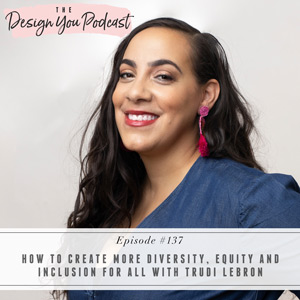
Up until May of this year, I didn’t mix politics with business. But George Floyd’s murder was the turning point for me to change my ways, and my eyes were greatly opened to the fact that I should have been doing a whole lot more in both my business and my life. I hired an amazing diversity, equity, and inclusion coach who has helped me implement so many changes in my business, and I’m so excited to welcome her on today’s episode to talk about creating safe spaces for all people!
Trudi Lebron is an international coach for entrepreneurs, non-profits, and corporate institutions. She helps them create social impact initiatives, and train leaders to lead with a lens for equity, diversity, inclusion, and impact. She joins me this week to tell us how to create a scalable, profitable business in a way that is just and equitable for all, and how you can make a change in the world.
Join us on the podcast this week if you’re interested in learning more about diversity and how to show up differently and make a stand in your business and life. We’re talking about politics, values, and making an impact, and sharing why it’s so important to have the courage to show up to do this essential work!
This is not an episode that has to mean you align with my politics, friends, nor is it an attack on anybody else’s politics; it’s for people who are interested in making a change and making sure all people, regardless of skin color, can have more opportunities and better life outcomes.
If you want help in creating financial freedom and building a business that’s fun and thriving, get on over to the Design You Coaching Program! We only enroll a few times a year, so be sure to sign up for the waiting list ASAP to be notified when we next open our doors!
If you want to keep this conversation going, you have to join my free Design You Podcast community on Facebook. We have great conversations over there about the podcast episodes and our podcast guests are in there too! So head on over and I’ll see you there!





